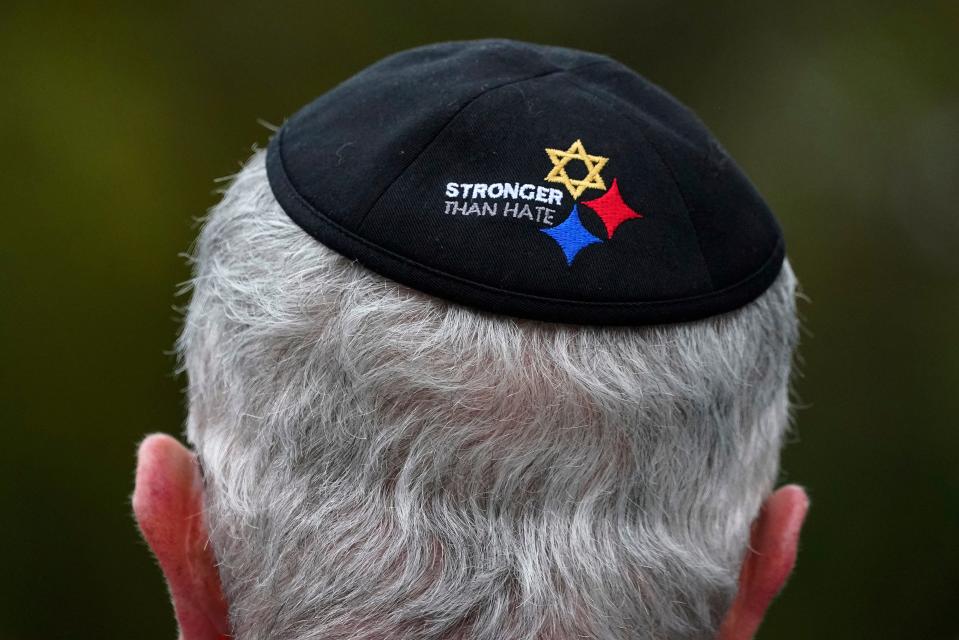Biden’s National Strategy to Counter Antisemitism will accelerate Louisville's efforts
- Oops!Something went wrong.Please try again later.
In an unprecedented step for an American president, the White House recently issued the National Strategy to Counter Antisemitism. This 60-page plan is the product of nearly a year of governmental work, with substantial input from national leaders, Jewish organizations like the Jewish Federations of North America, the American Jewish Committee, and the Anti-Defamation League, along with their Christian, Muslim and interfaith allies.
As if to underscore the gravity of the situation to which the plan is in response, just at the time that the plan was made public, a jury in Pennsylvania began to hear evidence in the Pittsburgh synagogue murder trial; the deadliest attack on Jews in American history. Among the many killed was a 97-year-old woman and two developmentally challenged brothers both in their 50s. They were doing nothing more than worshipping at services. The shooter was motivated by hatred of Jewish people.
Almost five years after that horrible day, antisemitism continues to rise, with ongoing bomb threats, vandalism and violent attacks against Jews and Jewish organizations. Even though Jewish people represent only about 2% of the population, studies have shown that close to two-thirds of religiously motivated hate crimes are antisemitic. And the hate is increasing. The Plan noted an ADL finding that there were more antisemitic incidents in this Country in 2022 than since the ADL began collecting this data. This rise is true here in Louisville and Kentucky as well, with several antisemitic incidents occurring right here in in the past year. In two examples, bomb threats were called in on our community centers and our parks were vandalized with antisemitic graffiti.
More: Antisemitism is surging across US. Biden just took a historic step to fight it.

Hatred of the Jewish people is becoming normalized.
To combat this normalization, the Strategy puts forth nearly 200 concrete actions. These include raising awareness of the threat, celebrating Jewish American heritage and increasing cross-community solidarity with other faith-based groups.
Two things really stood out for me.
First, the plan emphasizes teaching young people about the Holocaust. Among Millennials and Gen Z-ers, 63% of young people did not know that 6 million Jews died in the Holocaust, 60% didn’t know what Auschwitz was, and 11% thought Jews caused the Holocaust. As the Strategy found, “When conducted effectively, Holocaust education provides enduring lessons for all communities…[to learn what happens] when hatred goes unchecked [and] when people are silent as their neighbors are marginalized and murdered.” In short, a robust education in this area teaches kids and young adults about hate, bigotry, racism and oppression on a much broader scale and provides the tools improve our society.
Second, the Strategy highlights the need for interfaith partners to work together to foster safety for everyone. Faith-based organizations, institutions of higher education and racial and religious minority groups are all in the crosshairs of terrorists. Working collaboratively on security concerns increases our collective safety and also brings many disparate groups together.
Have something to say about today's news? Submit a letter to the editor here
We’re already doing some of this work here in Louisville and the White House’s plan will accelerate these efforts. Our local community is already working with JCPS, whose Office of Diversity, Equity and Poverty is innovating educational cohorts to “teach the teachers” about antisemitism in schools. The University of Kentucky, in conjunction with Louisville’s Jewish Heritage Fund, is developing statewide curricula about antisemitism. Our local efforts to enhance security include reaching out to other faith-based and targeted communities to help with their security and collaborating on trainings and facilities assessments. The White House plan will dovetail with that.
I hope that this effort can be expanded to overcome the hatreds, bigotries, and prejudices that both Jews and other groups face on a daily basis. The strategy depends on what it calls “the extraordinary decency of the vast majority of Americans and the simple truth that we are a great Nation because we are a good people.” Amen to that, and I hope you will take the time to read and reflect upon the report so that we can have discussions in our community about how to continue to find ways to ensure the safety and dignity of all those in our community and beyond. It is a powerful moment.

Matt Golden is a lawyer and the Director of the Jewish Community Relations Council, part of the Jewish Federation of Louisville. In his opinion, the JCRC is the most august body in the Jewish Community, seeking justice and doing tikkun olam. He is admittedly very partial and biased in this regard. He invites comments, suggestions or good stories at mgolden@ jewishlouisville.org.
This article originally appeared on Louisville Courier Journal: Biden’s plan to counter antisemitism accelerates Louisville's efforts

